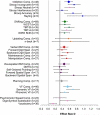Major depressive disorder is associated with broad impairments on neuropsychological measures of executive function: a meta-analysis and review
- PMID: 22642228
- PMCID: PMC3436964
- DOI: 10.1037/a0028727
Major depressive disorder is associated with broad impairments on neuropsychological measures of executive function: a meta-analysis and review
Abstract
Cognitive impairments are now widely acknowledged as an important aspect of major depressive disorder (MDD), and it has been proposed that executive function (EF) may be particularly impaired in patients with MDD. However, the existence and nature of EF impairments associated with depression remain strongly debated. Although many studies have found significant deficits associated with MDD on neuropsychological measures of EF, others have not, potentially due to low statistical power, task impurity, and diverse patient samples, and there have been no recent, comprehensive, meta-analyses investigating EF in patients with MDD. The current meta-analysis uses random-effects models to synthesize 113 previous research studies that compared participants with MDD to healthy control participants on at least one neuropsychological measure of EF. Results of the meta-analysis demonstrate that MDD is reliably associated with impaired performance on neuropsychological measures of EF, with effect sizes ranging from 0.32 to 0.97. Although patients with MDD also have slower processing speed, motor slowing alone cannot account for these results. In addition, some evidence suggests that deficits on neuropsychological measures of EF are greater in patients with more severe current depression symptoms, and those taking psychotropic medications, whereas evidence for effects of age was weaker. The results are consistent with the theory that MDD is associated with broad impairment in multiple aspects of EF. Implications for treatment of MDD and theories of EF are discussed. Future research is needed to establish the specificity and causal link between MDD and EF impairments.
(PsycINFO Database Record (c) 2013 APA, all rights reserved).
Figures

References
-
- Airaksinen E, Larsson M, Lundberg I, Forsell Y. Cognitive functions in depressive disorders: Evidence from a population-based study. Psychological Medicine. 2004;34:83–91. doi:10.1017/S0033291703008559. - PubMed
-
- Austin M, Mitchell P, Wilhelm K, Parker G, Hickie I, Brodaty H, Hadzi-Pavlovic D. Cognitive function in depression: A distinct pattern of frontal impairment in melancholia? Psychological Medicine. 1999;29:73–85. doi:10.1017/S0033291798007788. - PubMed
-
- Austin MP, Ross M, Murray C, O'Carroll RE. Cognitive function in major depression. Journal of Affective Disorders. 1992;25:21–30. doi:10.1016/0165-0327(92)90089-O. - PubMed
-
- Baba K, Baba H, Noguchi I, Arai R, Suzuki T, Mimura M, Arai H. Executive dysfunction in remitted late-life depression: Juntendo University Mood Disorder Projects (JUMP). The Journal of Neuropsychiatry and Clinical Neurosciences. 2010;22:70–74. doi:10.1176/appi.neuropsych.22.1.70. - PubMed
Publication types
MeSH terms
Grants and funding
LinkOut - more resources
Full Text Sources
Other Literature Sources
Medical

